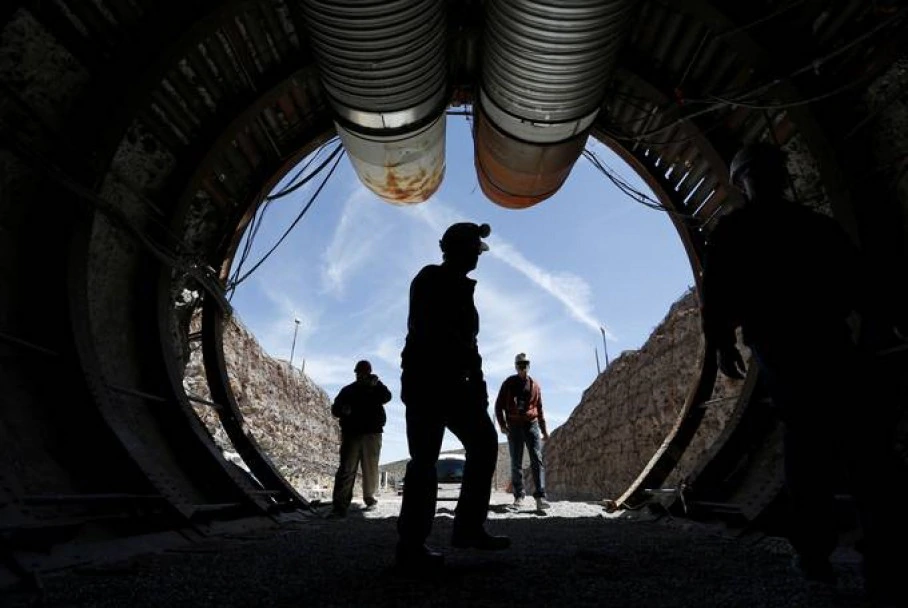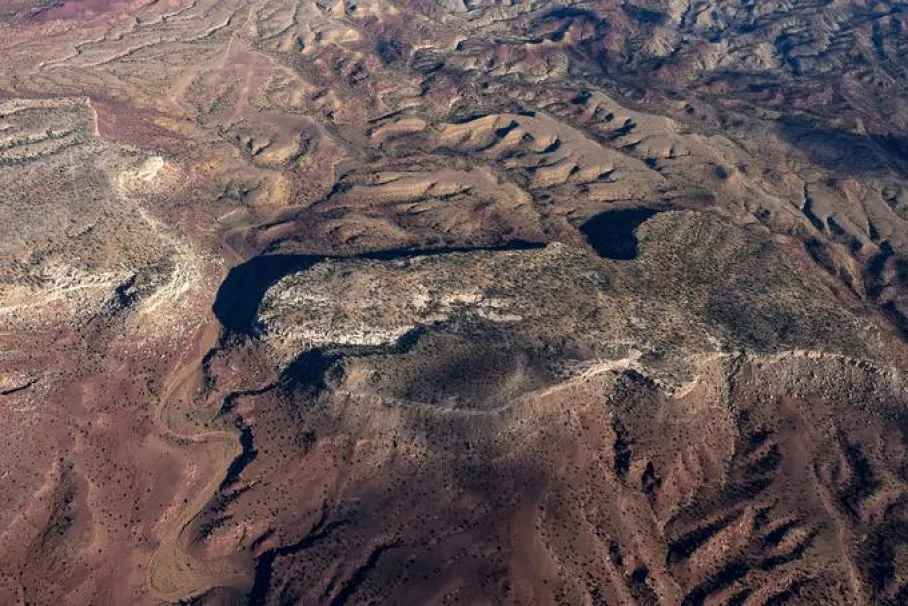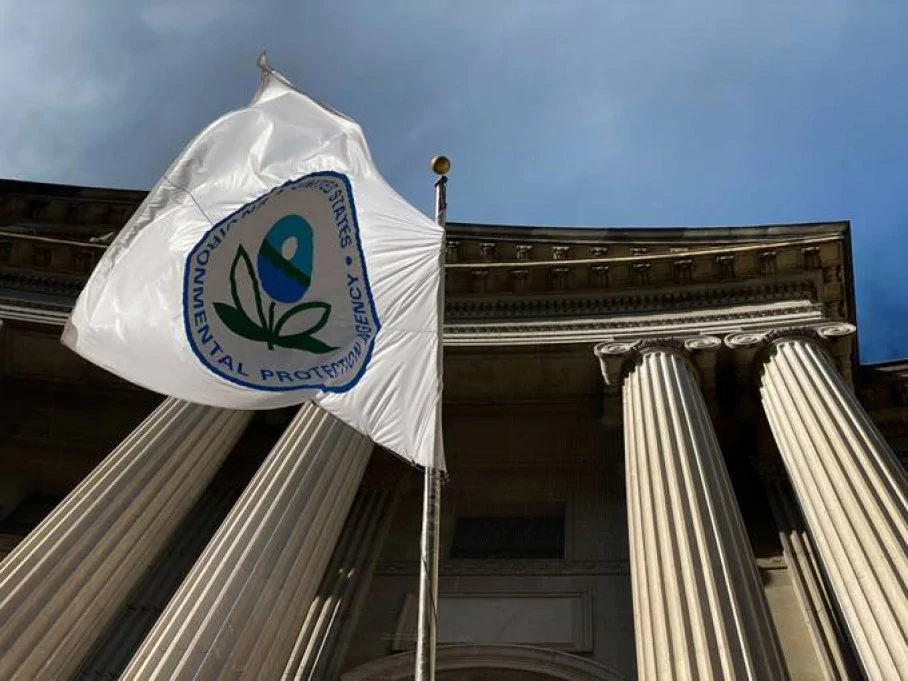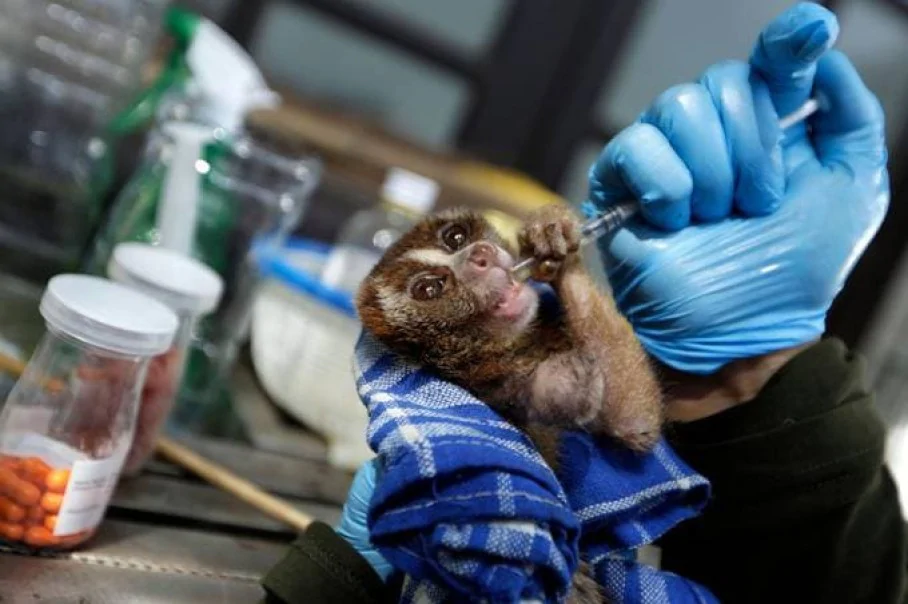THE LIGHTBULB

The south portal of Yucca Mountain outside Las Vegas. (John Locher/AP)
President Trump with one single tweet appeared to reverse his administration’s support of entombing dangerous radioactive material under the Yucca mountain.
Just nine months away from the 2020 election, Trump tweeted that he opposed the nuclear waste repository in the remote highlands of Nevada, a state Republicans hope to turn red after years of trending toward Democrats.
“Nevada, I hear you on Yucca Mountain and my Administration will RESPECT you! Congress and previous Administrations have long failed to find lasting solutions – my Administration is committed to exploring innovative approaches – I’m confident we can get it done!,” Trump fired off in a tweet Thursday evening.
Nevada, I hear you on Yucca Mountain and my Administration will RESPECT you! Congress and previous Administrations have long failed to find lasting solutions – my Administration is committed to exploring innovative approaches – I’m confident we can get it done!
— Donald J. Trump (@realDonaldTrump) February 6, 2020
It’s the latest about-face for Trump on a local environmental issue as he seeks to court voters from a series of swing states. Trump lost Nevada to Democratic nominee Hillary Clinton in 2016 by a slim 2.4-point margin.
The administration had promised to finish building the Yucca repository, first proposed in the 1980s as the site to store the nation’s ever growing pile of spent nuclear fuel and other radioactive waste.
The last budget request from Trump’s White House asked for $116 million to restart the licensing project. The previous two asked were $120 million. A senior administration official told Reuters the next funding request will not ask for any money to license the project.
Yet well before Trump took office, the would-be repository, about 100 miles northwest of Las Vegas, had already become the ultimate not-in-my-backyard project.
Nevada voters did not want the waste in their state, and politicians from both parties made careers out of opposing completion of the project. Nevada officials have argued seismic rumblings near the site make it unsuitable for storing waste that needs to be underground for tens of thousands of years.
No elected official did more to stymie it than Harry M. Reid. In 2010, the former Senate Democratic leader leveraged his powerful position to get the Obama administration to take Yucca funding out of its budget request.
The retired Nevada senator is happy to see Trump do the same thing. “I’m glad he has finally seen the light,” Reid tweeted.
Yucca Mountain is dead and will remain dead. This has been true for a long, long time. Donald Trump finally realizing this, changing his position and trying to take credit for its demise will not change that fact. I’m glad he has finally seen the light.
— Senator Harry Reid (@SenatorReid) February 7, 2020
Cautious praise came in too from Nevada’s current senators, Catherine Cortez Masto and Jacky Rosen, as well as Gov. Steve Sisolak. All three are Democrats.
Trump’s shift comes at a time when Republicans are pushing to build the next generation of nuclear power plants amid a growing effort within GOP ranks to address climate change, even though there is no permanent spot to store the long-lasting waste from today’s nuclear stations. Nuclear power currently produces more than half the nation’s carbon-free electricity.
In Trump’s early funding proposals, the Office of Management and Budget had sought to gut funding for restoration programs for the Great Lakes and Florida Everglades. But last year, amid pressure from Midwestern and Florida Republicans, Trump changed course and decided to support funding both programs.
“I support the Great Lakes,” Trump said at a rally last year in Grand Rapids, Mich., a state encircled by lakes Michigan, Huron and Erie that he carried by just 0.3 percent in 2016. “Always have. They’re beautiful. They’re big. Very deep. Record deep.”
POWER PLAYS

Apples are displayed at a farmers market in Arlington, Va. (AP Photo/J. Scott Applewhite)
— Giant pesticide manufacturer to stop making controversial chemical: Corteva Agriscience said Thursday it will stop making chlorpyrifos, a pesticide once widely used on corn, citrus and other crops but linked to neurological problems in children, The Post’s Brady Dennis and Juliet Eilperin report.
- The company succumbed to declining demand: With chlorpyrifos sales down to just 20 percent of what they were at their peak in the 1990s, Susanne Wasson, Corteva’s president of crop protection, explained: “It’s a tough decision for us to make, but we don’t feel like it’s viable going forward.”
- But the Trump administration has not given in to that same pressure: The Environmental Protection Agency had proposed revoking all uses of chlorpyrifos in 2015, when President Barack Obama was in office, over safety concerns from EPA scientists. But two years later, the EPA’s new administrator, Scott Pruitt, rejected the agency’s own analysis, arguing the issue needed further study.

Aerial view of Colt Mesa in Garfield County, Utah. (Bonnie Jo Mount/The Washington Post)
— Approval given to developing Utah lands: Trump’s Interior Department greenlighted plans Thursday to allow for drilling, mining and grazing in what was previously Bears Ears and Grand Staircase-Escalante, both protected national monuments, The Post’s Sarah Kaplan and Juliet Eilperin report. Officials said the new plans balance economic interests with protecting natural and cultural sites, but environmentalists and tribal groups say its disrespectful of the area’s biodiversity and significance to Native Americans.
- What’s currently there: “The expanses of wind-swept badlands, narrow slot canyons and towering rock formations are sacred to several Native American nations and prized by scientists and outdoor enthusiasts,” Kaplan and Eilperin write. “Bears Ears contains tens of thousands of cultural artifacts and rare rock art. In the rock layers of Grand Staircase, researchers have unearthed 75 million-year-old dinosaur fossils.”
- What’s in store: The government can begin approving new mining claims as soon as Oct. 1. The Bureau of Land Management will build two off-road vehicle routes in Grand Staircase. The plans don’t allow for commercial logging.

The Environmental Protection Agency headquarters in Washington. (Lucy Nicholson/Reuters)
— Trump EPA appointee who was ousted faults friendliness with Democrats: Head of the Environmental Protection Agency’s San Francisco headquarters Mike Stoker, who was abruptly fired Wednesday, blamed partisan politics and his close relationship with Democrats for his sacking, the Los Angeles Times reports. “It wasn’t going unnoticed how many Democrat members in Congress were commending me for the job I was doing,” he wrote in a statement about what he was told by another EPA official. Stoker was head of Region 9, which includes California, Nevada, Arizona, Hawaii, the Pacific Island Territories and 148 Indian tribes, for two years.
- Democratic support: “Stoker noted that several Democratic politicians had praised his work, including House Speaker Nancy Pelosi (D-Calif.), Rep. Tom O’Halleran (D-Ariz.), Rep. Scott Peters (D-Calif.) and Rep. Tulsi Gabbard (D-Hawaii). He pointed to his work on the cleanup of Hunters Point in San Francisco, addressing transboundary sewage in the San Diego-Tijuana corridor, and his focus on transuranium waste in Arizona and coral reefs in Hawaii,” the Times writes.
- Trump supporter: Stoker was is rumored to have started the “Lock her up!” chant about Hillary Clinton made popular at Trump rallies.

Philadelphia Energy Solutions plant refinery in Philadelphia. (Mark Makela/Reuters)
— New report reveals refineries spewed toxin: Air monitoring data suggests 10 oil refineries in the United States emitted benzene, a cancer-causing chemical, at levels exceeding federal thresholds, Reuters reports. The Washington-based Environmental Integrity Project analyzed a year’s worth of publicly available data, finding the refineries were surpassing the EPA standard of 9 micrograms per cubic meter of air at the fence line of their facilities. Six of the 10 are in Texas.
- Health risks from benzene: “Acute (short-term) inhalation exposure of humans to benzene may cause drowsiness, dizziness, headaches, as well as eye, skin, and respiratory tract irritation, and, at high levels, unconsciousness. Chronic (long-term) inhalation exposure has caused various disorders in the blood, including reduced numbers of red blood cells and aplastic anemia, in occupational settings,” according to the agency.

Former vice president Joe Biden at a campaign rally. (Mary Altaffer/AP)
— Joe Biden snags endorsement from electrical workers: The International Brotherhood of Electrical Workers union threw its support behind the former vice president, The Post’s Michael Scherer reports.
- Why Biden? “Unlike Sens. Bernie Sanders (I-Vt.) and Elizabeth Warren (D-Mass.), Biden opposes a ban on domestic fracking,” Scherer writes. The union’s president Lonnie R. Stephenson said Biden had “a realistic plan to combat the ongoing threat of climate change without putting energy security or working families at risk.” Biden has said he supports green energy but also understands the importance of continuing to invest in oil and gas.
- Manpower: The union has 775,000 active and retired members, meaning the endorsement could be a substantial boost for the candidate who had a disappointing fourth-place finish in the Iowa caucus.

A bumblebee and a bee sit on a sunflower on a field near Frankfurt, Germany. (Michael Probst/AP)
— Not-so-sweet news: Extreme heat caused by warming temperatures have contributed to a rapid decline in bumblebee populations in North America and Europe, The Post’s Chris Mooney reports. Previous reports have attributed the decline to pesticides and other causes, but new research indicates the climate may contribute.
- The buzz: “Relative to most other bees, bumblebees are exquisitely adapted to cold climate and live throughout the world in places that are seasonally cold,” May Berenbaum, an expert on insects and professor at the University of Illinois at Urbana-Champaign, told Mooney. “They’re effectively sewn into their winter underwear, as it were, so it’s a challenge for them to adjust behaviorally or physiologically to warming temperatures.”
- By the numbers: Researchers found that bees are in 46 percent less of North America and 17 percent less of Europe than previously found. Regions with the greatest variations in climate, including heat waves, had the steepest declines in bee populations.

Freshly pressed shirts on wire hangers. (Justin Sullivan/Getty Images)
— Figuring out what to do with wire hangers is a high-wire act: When was the last time you bought a wire hanger? Probably not recently. Yet closets across America are full of them. A 2007 federal study (yes, the government studied this) estimated that U.S. consumption was about 3.3 billion wire hangers annually, Vox reports. About 80 percent of that is from dry cleaners. This brings up the question: How do we get rid of all these hangers? About 3.5 billion that people don’t return to their dry cleaners or aren’t recycled by a company who collects hangers are thrown out in landfills, Vox writes.
- The problem: Recycling hangers “on a mass scale is difficult given that they are so often consumed incidentally and that their shape and coating can be problematic for the machines often used in mass recycling programs,” Vox writes.
DAYBOOK
Coming up:
- The House Appropriations Subcommittee on Interior, Environment, and Related Agencies holds Non-Tribal Public Witness Days today.
- The National Association of State Energy Officials holds its 2020 Energy Policy Outlook Conference and Innovation Summit in Washington, DC until Feb. 7.
- The New Hampshire Democratic debate will be on Feb. 7.
EXTRA MILEAGE
— Why you might be a dog person: A primate called the slow loris may have big eyes and fluffy fur, but it also has deadly venom. Scientists tested the venom and found similarities to cat dander, ABC News Australia reports. Further study could explain cat allergies in humans.

Slow loris (Nycticebus Coucang) gets a medical treatment from a vet at the Aceh Natural Resource Agency office in Banda Aceh, Indonesia. (Hotli Simanjuntak/EPA-EFE)


